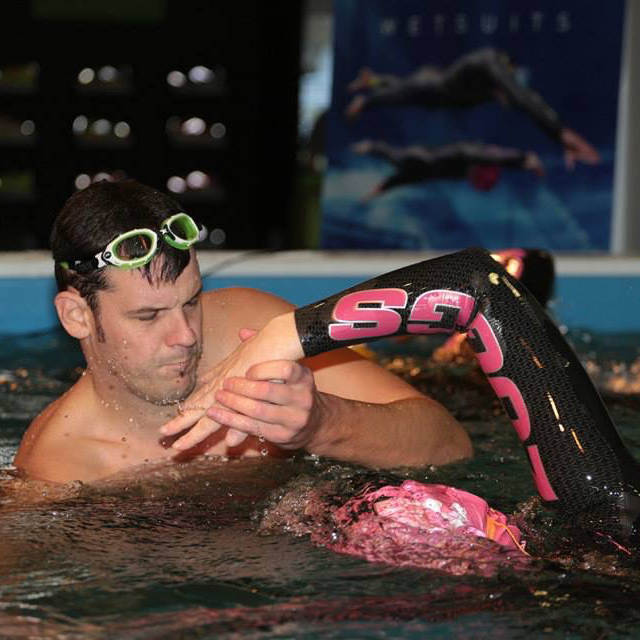
Pool Swimming Vs Open Water
Pool Swimming Vs Open Water Swimming. What are the differences? By Adam Walker
Water temperature
In open water it can vary depending on what month you swim, country and body of water. For instance, throughout the UK in the sea, on average the temperature will not go beyond 18 degrees centigrade in the season with the hottest months typically August and early September.
In a lake this could increase to 25 degrees depending on the size and how much sun there has been. In comparison the average pool temperature at a heated indoor sport centre is consistent across the world at 28-30 degrees.


Air temperature
Outside temperature can of course vary depending on the weather and the conditions. For example, swimming in rain and strong winds versus a consistent warm 30-32 degrees of an indoor pool.
When the air and water temperatures outside are low it can significantly affect your physical ability to swim relaxed. Also breathing can be more difficult, arms can feel heavier and mentally it can affect your concentration. However, swimming in open water will burn more calories than the pool as the body has to work harder in the cold. There are a number of other health benefits which include:
Health benefits
- It has been proven by scientists that by being immersed in cold water three times a week increases your white blood cell counts which helps fight infection and boost your immune system by activating antibodies and increasing the metabolic rate.
- In Sweden it’s common practice to let babies take naps outdoors in the cold, which has proven to not only help them be more resistant to diseases but they also sleep deeper and more soundly. Insomniacs are told to have cold showers to aid their sleep.
- In Siberia as a ritual they dump a bucket of cold water over the head of children aged 2-6 years old. It has shown that 95 per cent of children who participate are healthy through the flu season as opposed to 75 per cent of those children who do not take part.
- Better circulation – cold water exposure over time is shown to improve circulation, since cold water exposure causes your blood flow to be re-directed to your vital organs. It forces your body to circulate your blood more efficiently and effectively.
- Temperature regulation – cold water helps limit heat loss. As it decreases core body temperature it actually regulates overall body temperature.
- Relief from symptoms of depression – cold water has proven to help relieve the symptoms of depression. Due to the high density of cold water receptors in the skin, a cold dip is expected to send an overwhelming amount of electrical impulses from nerve endings to the brain, which can result in an anti-depression effect.
- Healthy skin and hair – cold water helps close the pores and doesn’t dry out your skin like the warm and chemically treated pool water. It is also great for your hair as cold temperatures close the hair cuticles, making it stronger.
- No chemicals – as well as irritating the skin, chlorine is absorbed by the body primarily through inhalation. Many pool swimmers suffer a cough or sore throat during and following a training session. Open water swimmers can breathe deep the fresh air of their surroundings.
- Energy increase – cold water boosts energy levels, nerve endings stand up and the heart starts racing. It is one of the best possible ways to give yourself a natural high.
- Helps you maximise your breathing capabilities – cold water forces you to breath deeper, by forcing you to pause momentarily as a reflex to the immersion. This opens up the lungs and helps bring in more oxygen.
- Minimise pain – reduces chronic pain, body aches and inflammation, regulates nervous system, improves kidney function and overall improves circulation.
- None resistance activity – ideal sport for individuals who have had injuries or impairments as it’s a non-weight bearing activity and resistance free, in addition you are working the majority of muscles so you still get a workout.


Other mental challenges
The differences aren’t just temperature; open water has a number of other mental challenges which don’t exist in the pool. You cannot stand up in the middle of a lake or sea like a pool which is a controlled area. You may also not be able to see anything apart from darkness below and therefore the feeling of being out of your depth or what lies underneath can be a challenge to overcome.
Training
In open water you are able to see how far you have swum and have the freedom of being at one with nature. In a pool you are restricted to the length of the pool which can also be boring swimming up and down wall to wall. It can also be easier to track your distance outside swimming around a lake, in comparison to doing laps in a pool.
Swim stroke
In open water you need to practice sighting as you will be swimming in a much bigger space, whereas in a pool you can follow the black line on the floor. If it’s a cloudy or foggy day outside, visibility can be tough making it harder to see where you’re going. Also, in open water you will need to practice swimming in rougher conditions and through waves and choppy water, whereas in the pool the water is guaranteed to be still. It is also easier to fall into a rhythm and pace in open water with no interruptions, whereas in a pool the wall can break up the stroke.
There is no doubt that open water presents far more mental and physical challenges to overcome than the pool and therefore arguably has a greater sense of achievement. At present there are many more pool swimmers than open water, but the popularity of open water swimming is growing.












